Labour MSP moves his amendmentspublished at 14:45 BST 6 June 2019
Alex Rowley moves his amendments calling for a 2032 target for reducing the proportion of households in fuel poverty to no more than 5%.
We have our first division, of five minutes.
Deputy First Minister John Swinney was at the helm of FMQs today, as Nicola Sturgeon is in France to mark the 75th anniversary of D-Day
Mr Swinney faced questions from Ruth Davidson, Richard Leonard, Patrick Harvie and Willie Rennie
MSPs asked about children at Dungavel, the £1bn shortfall in income tax receipt forecast, and Scottish women's football
Emma Gordon and Craig Hutchison
Alex Rowley moves his amendments calling for a 2032 target for reducing the proportion of households in fuel poverty to no more than 5%.
We have our first division, of five minutes.
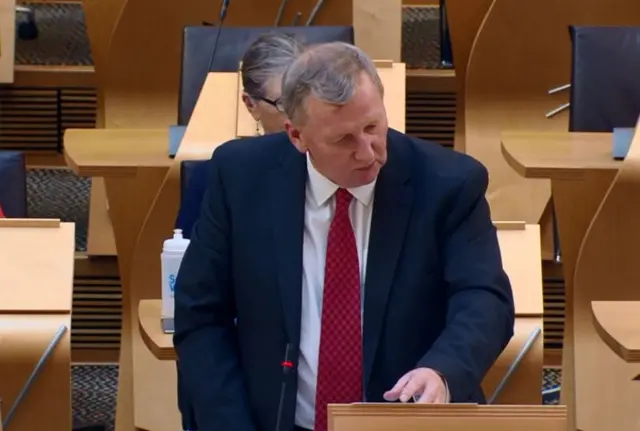
The bill is badly lacking ambition, says Mr Rowley, as he speaks to his amendments in Group 2.
The Labour MSP's amendments replace the 2040 target with 2032.
Green MSP Andy Wightman backs the amendments, but SNP MSP James Dornan does not, saying "I don't think we should be setting ourselves up to fail".
Graham Simpson says the Local Government and Communities Committee decided the 2040 target was more appropriate.
The minister expresses disappointment that Mr Rowley has brought these amendments back, citing the introduction of a 2030 interim target.
The Scottish government wants to go faster but there must be a realistic starting target to tackle fuel poverty, Mr Stewart says.
Mr Rowley accuses the SNP of joining the Tories to block a more ambitious target.
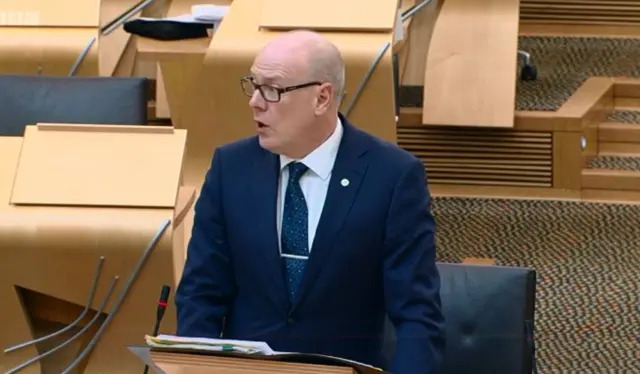
Local Government and Communities Minister Kevin Stewart welcomes Mr Simpson's amendments and moves on to speak to his own amendments in the group, which he says will provide measures.
Labour MSP Alex Rowley says his party won't support amendment 6 to 10.
Lib Dem MSP Liam McArthur welcomes Mr Simpson's amendments.
We move onto Group 2 before any vote is undertaken.
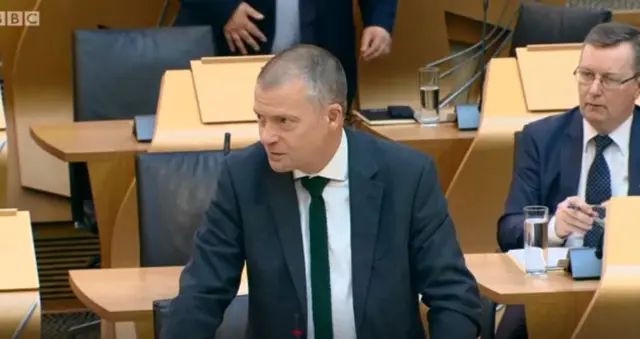
Graham Simpson tells the chamber he has 10 amendments to the bill in group 1.
The Tory MSP says he's worked on the wording of the amendments, with the help of the minister.
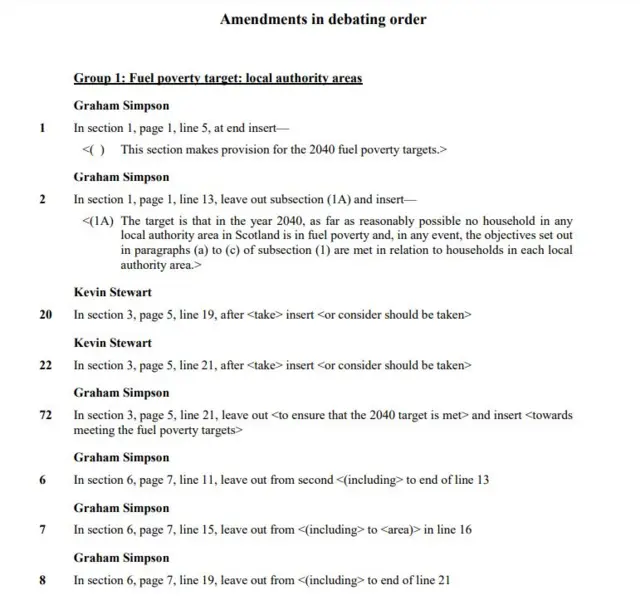 Image source, Scottish Parliament
Image source, Scottish ParliamentWe begin with Group 1: Fuel poverty target: local authority areas.
Here's the timed groupings of amendments for Stage 3 again., external
MSPs will now debate the Fuel Poverty (Target, Definition and Strategy) (Scotland) Bill , externalfor the final time.
The bill will:
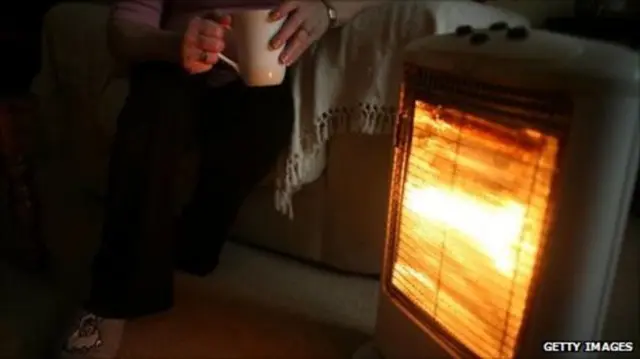 Image source, Getty Images
Image source, Getty ImagesThe government plans to reduce energy bills by an average of £50 a year in an effort to offset rising costs
You'll need these for the debate and voting on the amendments:
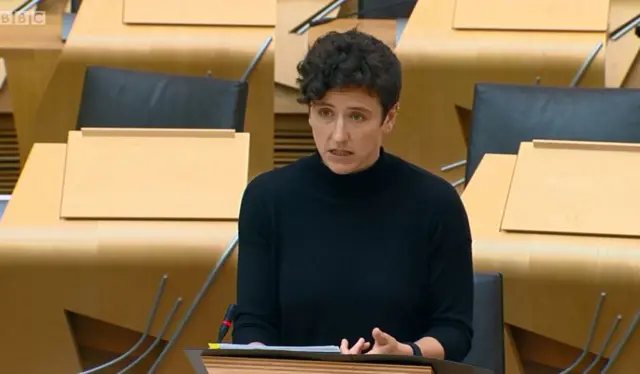
Rural Affairs Minister Mairi Gougeon says the partnership plays a valuable role in helping tackle crime in our rural communities.
Ms Mitchell highlights livestock worrying, theft, and in particular fly tipping.
She calls for support for the campaign to give powers to local authorities to make compensation orders.
Ms Gougeon agrees fly tipping is a serious issue and says the cabinet secretary will consider Miss Mitchell's proposals.
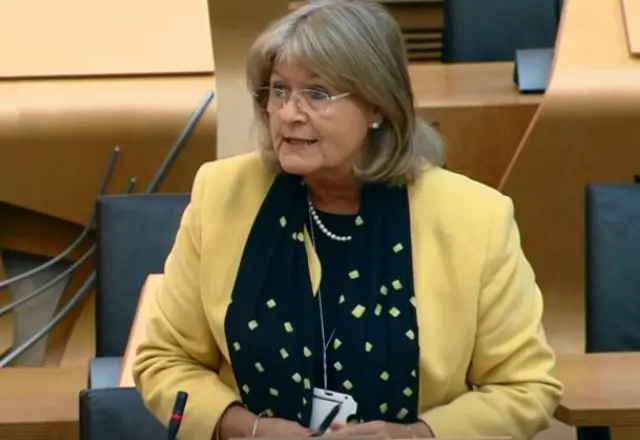

Police in the Borders have urged farmers and people living in rural areas to report any suspicious activity they see "immediately".
It comes after thefts of a quad bike and 4x4 from the Hownam and Plenderleith areas on Wednesday.
Police said people should report any concerns straight away rather than waiting until the next day.
They said the Borders was a "very large rural area of nearly 2,000 square miles" with early communication vital.
A statement said it would allow them to target resources "most effectively" and maximise their ability to catch thieves..
Tory MSP Margaret Mitchell seeks an update on the work of the Scottish Partnership Against Rural Crime.
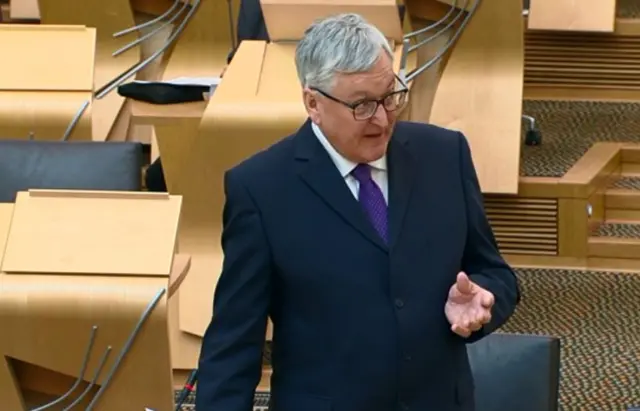
Rural Economy Secretary Fergus Ewing says the government works with the health and safety executive to provide guidance to farmers to help them be safer.
Mr Ewing adds the government is also working with the Scottish Farm Safety Partnership and is considering what role it will play in this week's Farm Safety Week.
Ms Harris says a month ago two people were killed in a tragic accident in Central Scotland and she asks about children's safety on farms.
The minister says his thoughts go out to the families of the two men who were killed by the collapse of a wall.
Mr Ewing says this is probably the area of life in Scotland where there is still a far, far too high risk of injury or death.
SNP MSP Emma Harper asks if the minister backs her call for quad bikers on farms to wear helmets, to which the minister concurs and says not wearing one is stupid.
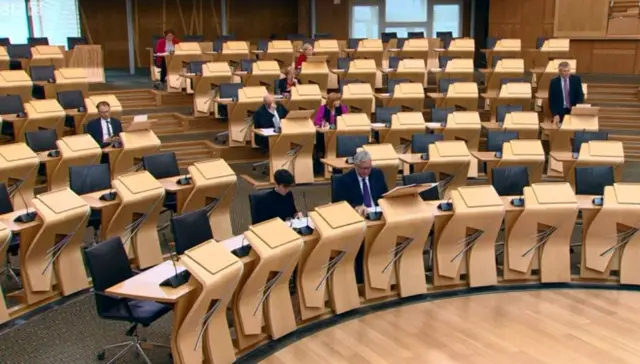
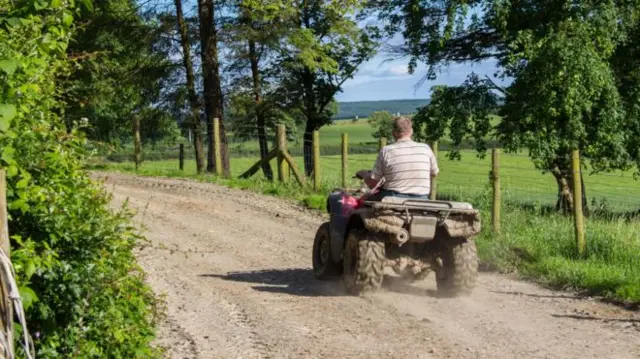 Image source, Getty Images
Image source, Getty ImagesFarmers have been warned not to become complacent and always use a helmet on a quad bike
Tory MSP Alison Harris asks what the government's plans are for Farm Safety Week 2019.
Figures published by the Health and Safety Executive , external(HSE) have revealed that over the past decade to 2018 almost 80 men, women and children have died on Scottish farms and significantly more have been badly injured as a result of farming activities.
The statistics for the last decade show:
 Image source, BBC/Getty
Image source, BBC/GettyRural economy face questions from MSPs. Click here for the full list., external
Coming up in the chamber...............
Mental Health Minister Clare Haughey says trauma can also come from domestic violence and child abuse.
The SNP MSP says thousands of people offer assistance in Scotland, and speaks of resilience in humans.
Ms Haughey praises the remarkable services in Scotland that help people who have experienced trauma.
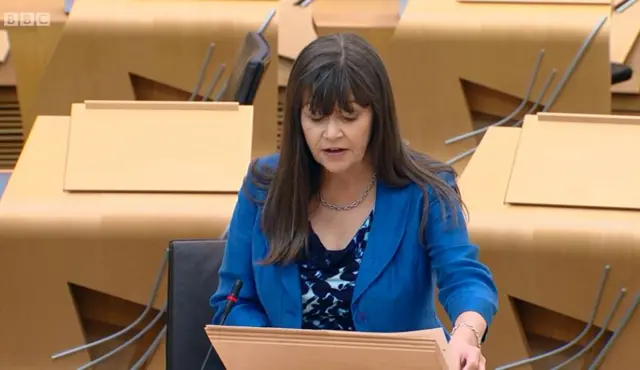 Image source, bbc
Image source, bbcMental Health Minister Clare Haughey
She points out all nations must be prepared to deal with the aftermath of tragedies like the attacks on the Manchester arena and Tunisia, and details measures being brought in by the Scottish government including training.
The National Trauma Training Programme has agreements with every health board to train staff, she adds.
The minister closes by thanking the emergency services and people who help others.
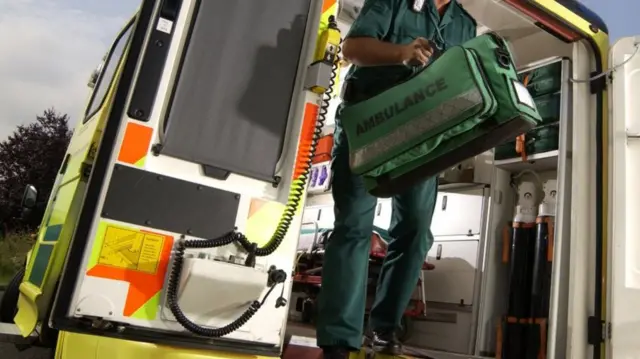 Image source, Getty Images
Image source, Getty ImagesHundreds of lives have been saved by a new ambulance response system which prioritises life-threatening calls, a study has found.
The Scottish Ambulance Service changed the way it responds to the most unwell patients in 2016.
Incidents such as cardiac arrests are now given the highest priority by call handlers.
An evaluation of the changes has concluded the system has saved the equivalent of 1,182 lives.
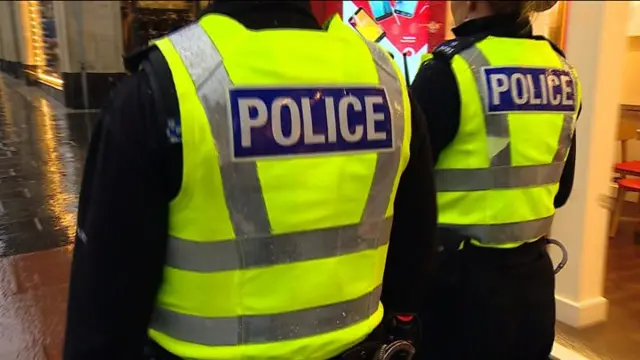
Post-traumatic stress disorder (PTSD) among police officers in the UK is far more common than was ever thought, a new survey suggests.
The study of almost 17,000 police across the UK found that 95% of officers and 67% of operational police staff had been exposed to traumatic events, almost all of which were work-related.
Of those who had experienced trauma, 20% reported symptoms in the preceding four weeks that were consistent with PTSD or the more chronic condition, Complex PTSD, which is associated with emotional numbness and disconnection.
Two-thirds of those with PTSD were unaware they were suffering from it, according to the research.
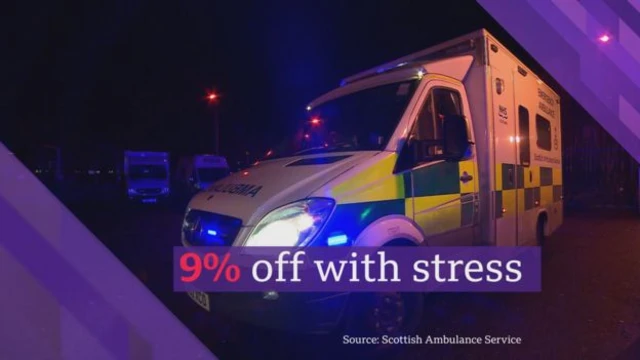
The number of paramedics signed off work with depression or stress increased by more than 40% last year, according to figures from The Nine.
The statistics show that 9% of all Scottish paramedics took sick leave due to stress-related illness in 2018.
Insiders have told the BBC these numbers could be masking an even bigger problem.
They said there was a reluctance to accept that staff were suffering and managers were not trained properly.
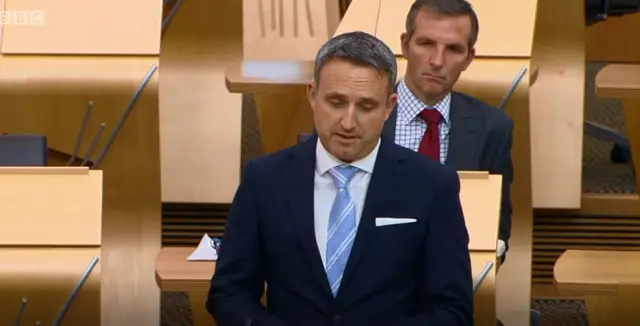
Lib Dem Alex Cole-Hamilton calls first responders unassuming heroes who deserve thanks.
He says trauma experienced by attending scenes of accidents can be compared to combat stress.
Paramedics can suffer PTSD, he tells the chamber, and are sometimes faced with violence while attending calls.
The MSP says one in four ambulance responders have considered ending their own lives, and deserve better support.
He tells of being a first responder himself, when a man fell to his death, and says he sought counselling.
Lib Dem MSP Alex Cole-Hamilton is leading a debate titled 'trauma recovery and support for first responders',
He is highlighting the mental health impact of witnesses scenes of trauma and death on first responders, both in the emergency services and members of the public.
The Lib Dem MSP is calling for a national first responder trauma recovery strategy to be established.
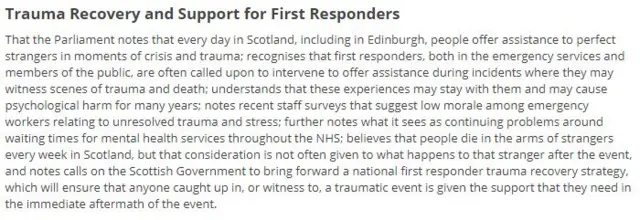 Image source, Scottish Parliament
Image source, Scottish ParliamentHere is his motion in full
Allow X content?
This article contains content provided by X. We ask for your permission before anything is loaded, as they may be using cookies and other technologies. You may want to read X’s cookie policy, external and privacy policy, external before accepting. To view this content choose ‘accept and continue’.